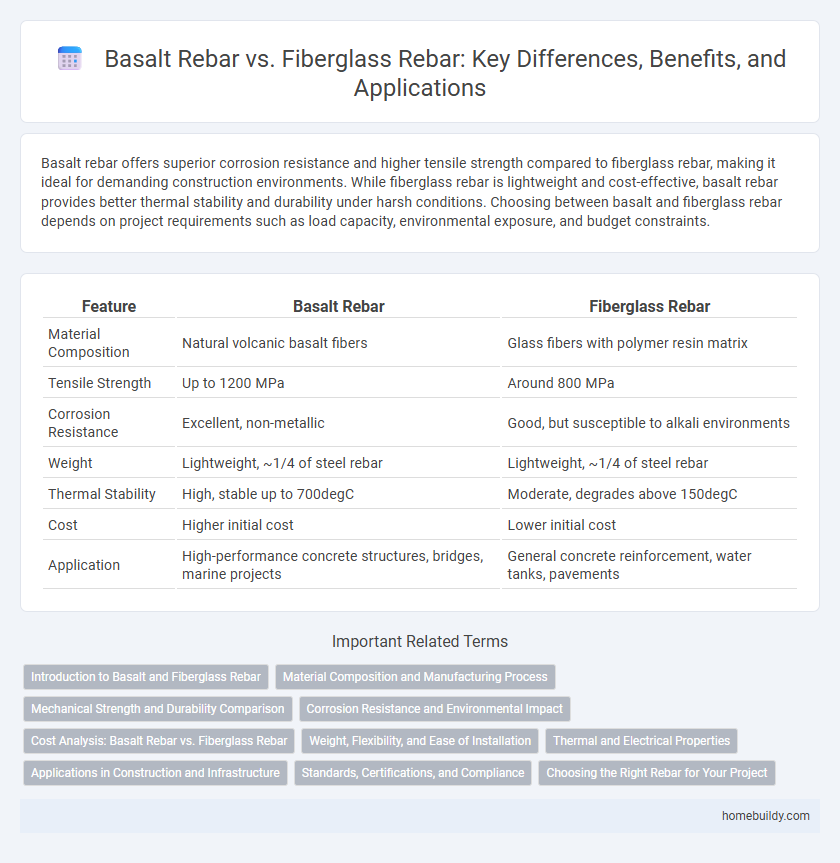Basalt rebar offers superior corrosion resistance and higher tensile strength compared to fiberglass rebar, making it ideal for demanding construction environments. While fiberglass rebar is lightweight and cost-effective, basalt rebar provides better thermal stability and durability under harsh conditions. Choosing between basalt and fiberglass rebar depends on project requirements such as load capacity, environmental exposure, and budget constraints.
Table of Comparison
| Feature | Basalt Rebar | Fiberglass Rebar |
|---|---|---|
| Material Composition | Natural volcanic basalt fibers | Glass fibers with polymer resin matrix |
| Tensile Strength | Up to 1200 MPa | Around 800 MPa |
| Corrosion Resistance | Excellent, non-metallic | Good, but susceptible to alkali environments |
| Weight | Lightweight, ~1/4 of steel rebar | Lightweight, ~1/4 of steel rebar |
| Thermal Stability | High, stable up to 700degC | Moderate, degrades above 150degC |
| Cost | Higher initial cost | Lower initial cost |
| Application | High-performance concrete structures, bridges, marine projects | General concrete reinforcement, water tanks, pavements |
Introduction to Basalt and Fiberglass Rebar
Basalt rebar is manufactured from basalt rock, offering high tensile strength and exceptional corrosion resistance compared to traditional steel rebar. Fiberglass rebar, made from glass fibers combined with a resin matrix, provides lightweight reinforcement with strong resistance to chemical corrosion and non-conductive properties. Both materials serve as durable alternatives to steel rebar in concrete construction, enhancing structural longevity and performance.
Material Composition and Manufacturing Process
Basalt rebar is produced from basalt rock through a melting and extrusion process resulting in high tensile strength and natural corrosion resistance, while fiberglass rebar is manufactured by combining glass fibers with resin through pultrusion, offering lightweight properties and flexibility. The chemical stability of basalt fiber contributes to its superior durability in harsh environments, whereas fiberglass relies on polymer matrices which may degrade under UV exposure. Both materials provide non-corrosive alternatives to steel rebar but differ significantly in their raw materials and fabrication techniques impacting performance and application.
Mechanical Strength and Durability Comparison
Basalt rebar exhibits superior mechanical strength with tensile values reaching up to 1400 MPa, outperforming fiberglass rebar which typically ranges between 800 to 1000 MPa. In terms of durability, basalt rebar demonstrates excellent resistance to chemical corrosion, UV exposure, and high temperatures, making it ideal for aggressive environments. Fiberglass rebar offers adequate corrosion resistance but tends to degrade faster under prolonged UV and thermal exposure, reducing its long-term performance compared to basalt alternatives.
Corrosion Resistance and Environmental Impact
Basalt rebar exhibits superior corrosion resistance compared to fiberglass rebar due to its natural basalt fiber composition, which resists chemical degradation in harsh environments. Environmental impact assessments favor basalt rebar as it is made from abundant natural volcanic rock, reducing reliance on synthetic materials and minimizing carbon footprint during production. Fiberglass rebar, while also corrosion-resistant, involves energy-intensive manufacturing from petroleum-based resins that contribute to higher environmental pollution and limited recyclability.
Cost Analysis: Basalt Rebar vs. Fiberglass Rebar
Basalt rebar typically costs 10-15% more than fiberglass rebar but offers higher tensile strength and durability, which can reduce long-term maintenance expenses. Fiberglass rebar provides a cost-effective solution with corrosion resistance, making it suitable for projects with tight budgets and exposure to moisture. Evaluating lifecycle costs, basalt rebar's superior mechanical properties often justify the initial investment in infrastructure requiring extended service life.
Weight, Flexibility, and Ease of Installation
Basalt rebar offers superior strength-to-weight ratio, making it lighter yet more durable than fiberglass rebar, which enhances load-bearing capacity without increasing structural weight. Its higher flexibility allows basalt rebar to bend without cracking, improving performance in seismic zones and complex architectural designs compared to the stiffer fiberglass option. The ease of installation for basalt rebar is greater due to its compatibility with conventional cutting and bending tools, reducing labor time and costs over the more brittle fiberglass rebar that requires specialized handling.
Thermal and Electrical Properties
Basalt rebar exhibits superior thermal resistance with a high melting point around 1,300degC, making it ideal for applications requiring fire-resistant reinforcement. Fiberglass rebar, while offering good electrical insulation properties, has a lower thermal tolerance, typically degrading above 130degC. The electrical resistivity of basalt rebar surpasses fiberglass, ensuring better performance in environments prone to electromagnetic interference.
Applications in Construction and Infrastructure
Basalt rebar offers superior chemical resistance and high tensile strength, making it ideal for heavily corrosive environments such as marine structures and chemical plants. Fiberglass rebar provides excellent flexibility and lightweight properties, which are preferred in infrastructure projects requiring ease of handling and installation, such as bridges and highways. Both materials significantly enhance durability and reduce maintenance costs compared to traditional steel rebar in construction applications.
Standards, Certifications, and Compliance
Basalt rebar complies with ASTM D7957 and ACI 440.6 standards, ensuring high tensile strength and chemical resistance for infrastructure projects. Fiberglass rebar meets ASTM D7264 and AASHTO M330 requirements, verified by certifications like ICC-ES and NSF for non-corrosive reinforcement in concrete structures.
Choosing the Right Rebar for Your Project
Basalt rebar offers superior tensile strength and corrosion resistance compared to fiberglass rebar, making it ideal for structures exposed to harsh environmental conditions. Fiberglass rebar is lighter and more cost-effective, suitable for projects requiring ease of handling and moderate durability. Evaluating the specific structural requirements, environmental exposure, and budget constraints ensures the selection of the optimal rebar type for long-lasting reinforced concrete performance.
Basalt Rebar vs Fiberglass Rebar Infographic

 homebuildy.com
homebuildy.com